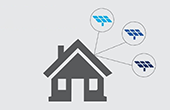Did you know that sunny Florida ranks 3rd in the United States for solar potential, but only 14th in terms of rooftop solar installed? We need to do something about that. Lucky for you, EnergySage is here to tell you more about Florida’s solar policies, and to help you find the best solar installer in the state.
The best way to compare your solar options and save money at the same time is by registering on the EnergySage Marketplace. When you compare quotes for solar panels on EnergySage's competitive solar marketplace, you can expect to see prices up to 20% lower than working with a single solar company. Read our updated article on the cost of solar panels to compare solar costs across states and by panel brand.
Reasons to go solar in the “Sunshine State”: Florida solar incentive programs
There are a few great solar programs to help Floridians take advantage of all that sun, including:
Florida net metering
FL Net Metering is one of the most important regulatory policies for residential solar owners in Florida (and many other states across the country) because it allows you to sell any excess solar energy you may have back to the grid. So while you are out and about during the day and not using much electricity at your house, your solar panels can be hard at work saving you money.
Check out the top utility net metering programs in Florida:
Florida tax incentives for solar
Property tax exemption
Normally, when you build an addition or otherwise add value to your house, your property tax bills shoot up. Not so with solar. Thanks to Florida’s Property Tax Exclusion for Residential Renewable Energy Property, your solar system will not result in any additional costs on tax day.
Sales tax exemption
Additionally, you will not even have to pay sales tax when you buy your new solar energy system, thanks to the Solar and CHP Sales Tax Exemption! That’s a 6 percent savings on what you would otherwise pay.
The federal solar tax credit
Don’t forget about federal solar incentives! With the investment tax credit (ITC), now referred to as the Residential Clean Energy Credit for residential systems, you can reduce the cost of your PV solar energy system by 30 percent. Keep in mind that the ITC applies only to those who buy their PV system outright (either with a cash purchase or a solar loan), and that you must have enough income for the tax credit to be meaningful (unless you’re a tax-exempt entity, in which case you might be eligible for a direct payment).












